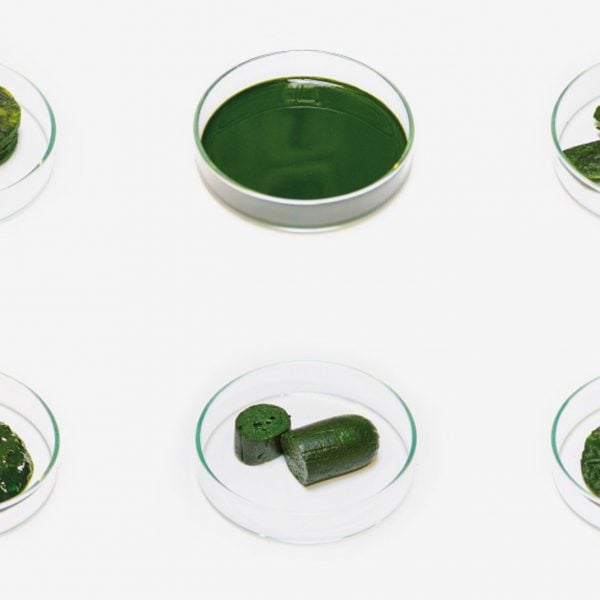Dezeen School Shows: as 2024 comes to a close, we’ve selected 12 of the most intriguing design and architecture projects that have been published on Dezeen School Shows this year.
These projects are from both undergraduate and postgraduate courses, ranging from textile design to architecture, covering topics which span social themes and concepts through material exploration and technical skills.
Included in this roundup is a design for sustainable prayer mats, a proposal for a creative community centre and an electric vehicle charging port made from natural materials.
The selection of projects comes from students on object design, architecture and industrial design courses from both UK-based and international institutions including University of Melbourne, University of the Arts London and Lucerne School of Design, Film and Art.
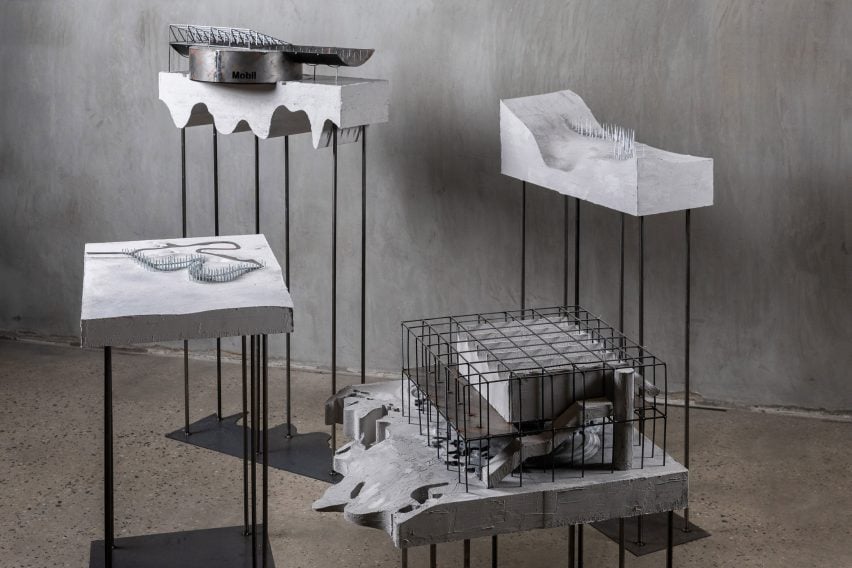
Atlas of Extraction by Michaela Prunotto
Michaela Prunotto produced Atlas of Extraction whilst studying on their Master of Architecture Design Thesis course at the University of Melbourne.
Published on Dezeen School Shows in January, the project explores the concept of ‘terrascapes’ – a scene of significant geological disturbance, caused by colonial extraction and expansion.
“As the beginning of an open project, this atlas explores four terrascapes: the Beech Forest Quarry (where sandstone was extracted), the Westgate Lakes (a former sand mine), the Birrarung River (subject to dredging) and a disused car factory (which has petrochemical soil contamination),” said Prunotto.
“Each corresponding proposition bares dirty histories for confrontation, while also proposing a programmatic ethic of care and renewal.”
Student: Michaela Prunotto
School: University of Melbourne
Course: Master of Architecture Design Thesis
View the full school show ›
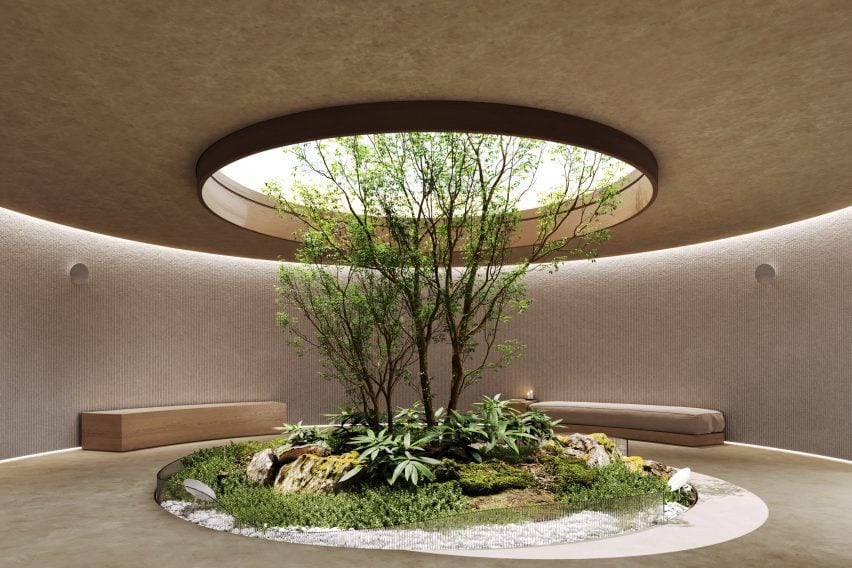
The Alternative Space by Amit Arbiv
In Feburary, The Alternative Space by Interior and Furniture Design student Armit Arbiv was published on Dezeen School Shows.
Designed to be a space to aid stress, Arbiv identified necessary guidelines for creating a relaxing environment, identifying four components that should be implemented in the design process.
“The project has no specific location and its principles can be implemented in various locations as long as the guidelines are applied,” Arbiv said.
“In the process, I learned about the important things in interior design that can assure relaxation and de-stress people, such as colour, lighting and shapes.”
Student: Amit Arbiv
School: Istituto Europeo di Design
Course: IED Firenze – Three-Year Course in Interior and Furniture Design
View the full school show ›
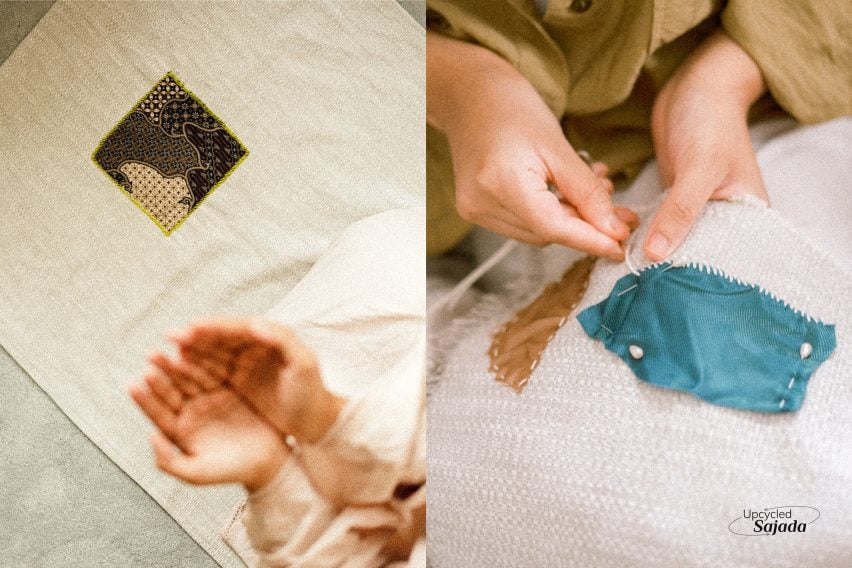
Upcycled Sajada by Tika Pratiwi Sufyan
Design student Tika Pratiwi Sufyan produced Upcycled Sajada, which was published on Dezeen School Shows in March.
The project explores the possibilities of creating eco-friendly prayer mats, through methods such as upcycling, aiming to reflect values of sustainability within Islamic beliefs.
“The Upcycled Sajada brand holds three core values – to repurpose production, reflect on sustainability and Islamic values and reconnect with communities and individuals,” said Sufyan.
Sufyan also aimed to promote “awareness of sustainability values in young practising Muslims.”
Student: Tika Pratiwi Sufyan
School: University of the Arts London
Course: MA Design Management
View the full school show ›
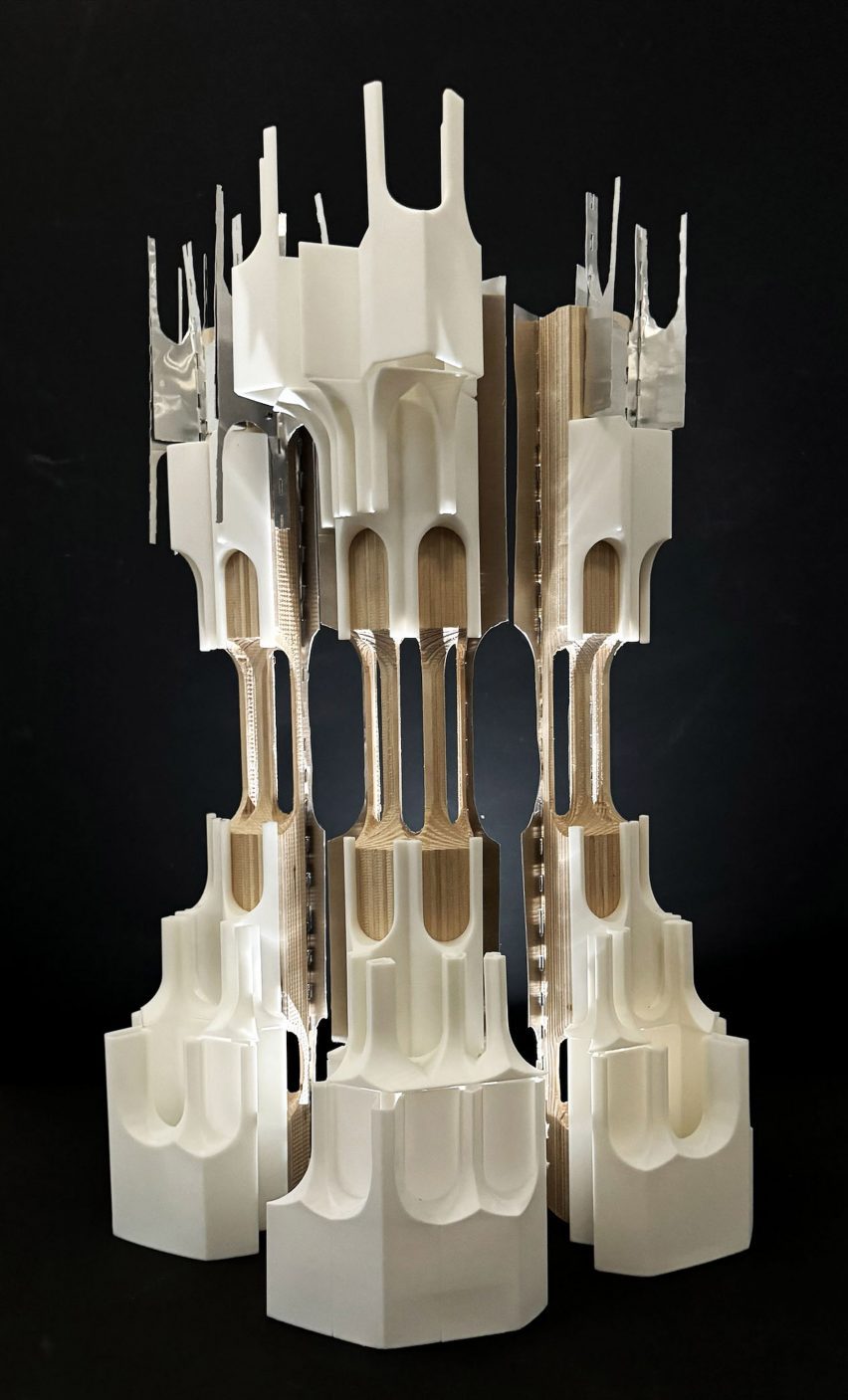
Deconstructing Muqarnas by Yashraj Chauhan and Arefin Chisty
In April, Yashraj Chauhan and Arefin Chisty’s project Deconstructing Muqarnas was published on Dezeen in New York Institute of Technology‘s School Show.
Produced whilst studying Fabrication and Robotics, the project is a proposal for a lighting installation which explores utilising computational design for traditional craftsmanship techniques.
“The prototype proposes a lighting installation that combines both light and shadow interactions with folded aluminium sheets,” Chauhan and Chisty explained.
“The Muqarnas in this case is treated as a deconstructed component that manifests in three different forms; the first form is the wooden component that acts as a structural column, the second form are translucent resin 3D pieces and the third form is the deconstructed unfolded metal components.”
Student: Yashraj Chauhan and Arefin Chisty
School: New York Institute of Technology
Course: Fabrication and Robotics
View the full school show ›
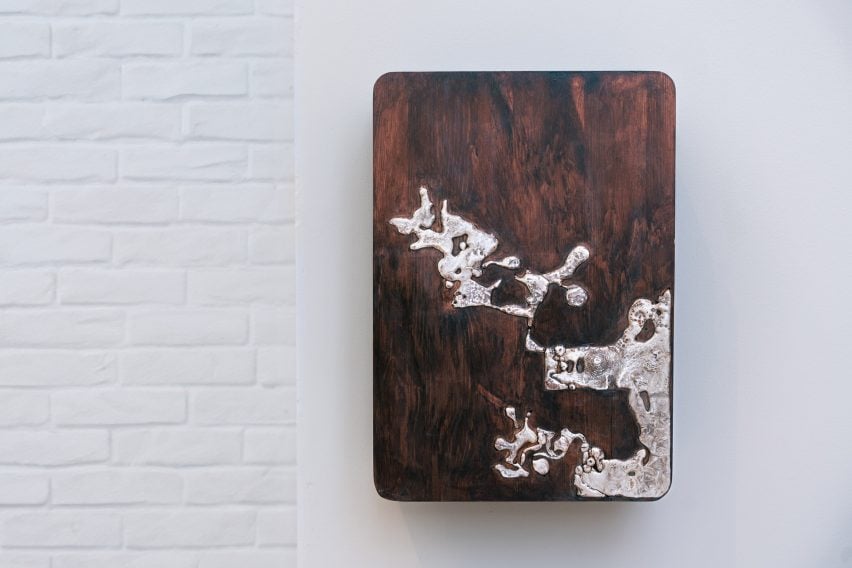
Haeckel by Mo Ramadan
In this School Show published in May, Industrial Design student Mo Ramadan created Haeckel, an electric vehicle charging point inspired by the illustrations of Ernst Haeckel.
As Haeckel’s style is inspired by details of the natural world, Ramadan ensured to use materials that “age gracefully”, honing in on their maturing qualities that occur over time.
Just as Haeckel found beauty in the complexity and order of biological forms, this design aims to capture the subtle yet profound transformation that materials undergo with age,” Ramadan said.
“The intersection of Haeckel’s artistic vision with the natural patina of ageing materials was a deep source of inspiration for this piece, guiding the creation of a design that honours nature’s transient yet timeless aspects.”
Student: Mo Ramadan
School: University for the Creative Arts
Course: Industrial Design
View the full school show ›
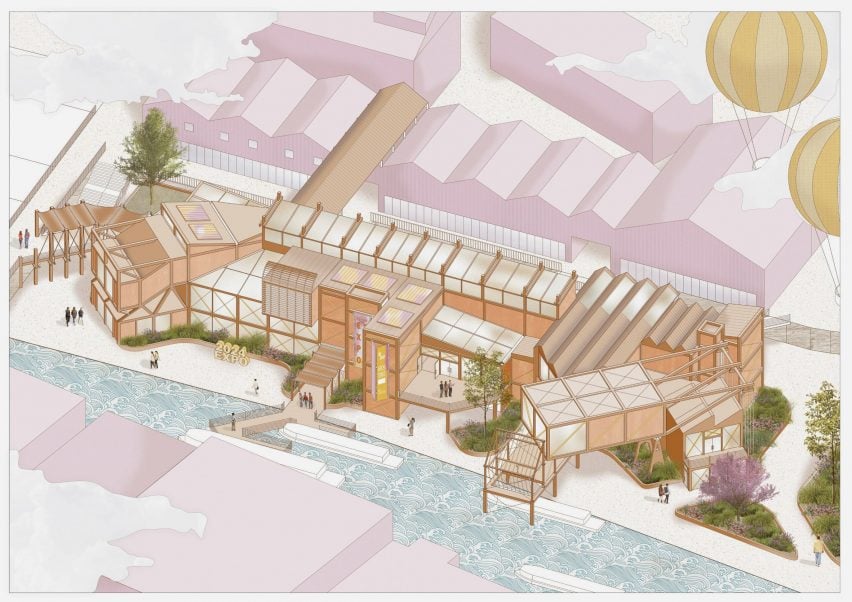
The Loop Collective by Emily Kajdi
Architecture student Emily Kajdi produced The Loop Collective, a creative community centre focused on furniture design, with workshops for woodworking and upcycling and a collection system for discarded furniture items.
Published on Dezeen School Shows in June, the project aims to provide a space for like-minded designers to connect and collaborate.
“The design of the facility is focused on using sustainable local materials where possible and keeping furniture for as long as possible,” said Kajdi.
“The project aims to reduce fly-tipping and educate local communities on the value of furniture-making and upcycled furniture.”
Student: Emily Kajdi
School: BA (Hons) Architecture (full-time)
Course: London South Bank University
View the full school show ›
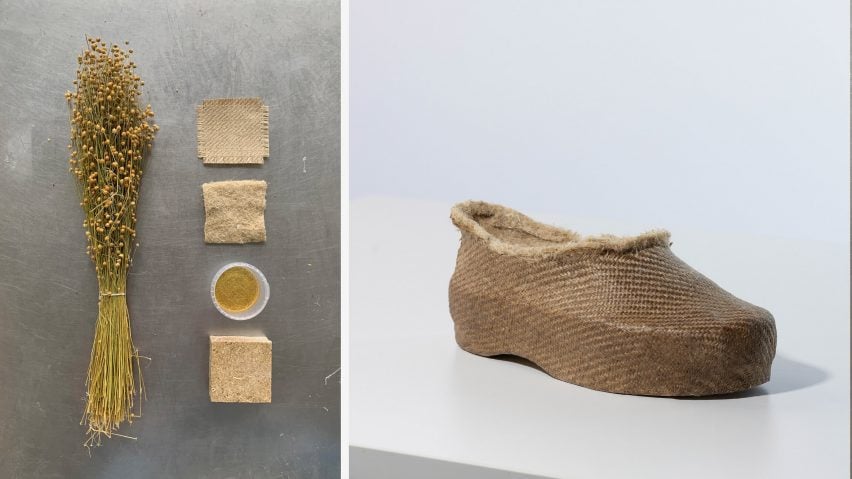
Fibræ by Mattia Gagliano
Mattia Gagliano’s project Fibræ was published on Dezeen School Shows in July, utilising the material of flax to show its versatility.
“The traditional material is being used more and more in various products and industries, albeit often in combination with composites that have a negative impact on their recyclability,” Gagliano said.
“My goal is to demonstrate the versatility of flax as a plant, to abstain from combinations with non-compostable material and to retain flax’s natural characteristics.”
Student: Mattia Gagliano
School: Lucerne School of Design, Film and Art
Course: Bachelor Object Design
View the full school show ›
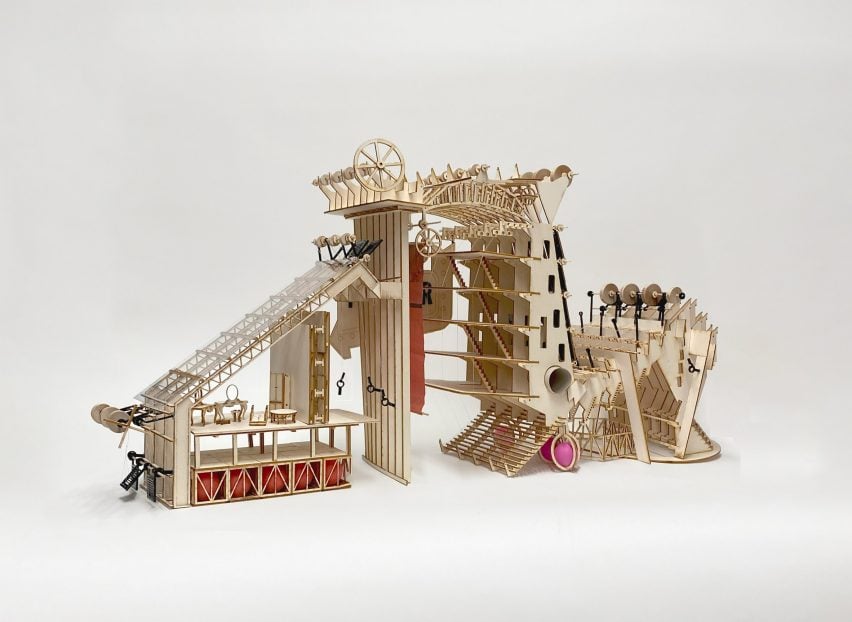
Flooding: The Anatomy of Propaganda by Aleksandra Lemieszka
Flooding: The Anatomy of Propaganda by Engineering and Architecture student Aleksandra Lemieszka was published in The Bartlett’s School Show in August.
The project proposes repurposing an old meat market into a printing hall for unbiased, free media.
“The suspended printing machine, visible to museum visitors, symbolises transparency, as it rises above the flood of propaganda,” said Lemieszka of the design.
“Journalists remain anonymous to prevent leaks and undue influence, with newspapers dispatched through secret canal passages, delivering on the project’s goal of preserving truthful and independent media.”
Student: Aleksandra Lemieszka
School: Engineering & Architectural Design MEng (ARB/RIBA Part 1 CIBSE JBM), Unit 4
Course: The Bartlett School of Architecture
View the full school show ›
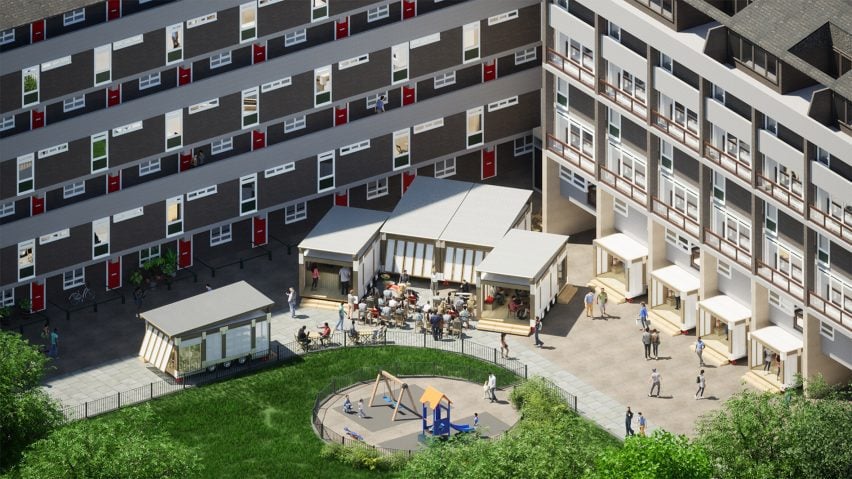
Mursell Council Estate by Charlie Smale
Architecture student Charlie Smale produced Mursell Council Estate, which was published on Dezeen in the University of Brighton School Show in September.
Proposing moveable market stalls to be used in a council estate in London, UK, the project intends to encourage community activities and events amongst locals.
“The market pods work independently as shops, food vendors and community facilities, but can also be attached to create larger social spaces that allow for larger community events,” explained Smale.
“The pods can be easily changed by the residents to suit their needs facilitated by the bolted glulam structure which can be easily dismantled; this ensures that interventions can be adapted as required.”
Student: Charlie Smale
School: University of Brighton
Course: BA (Hons) Architecture L6
View the full school show ›
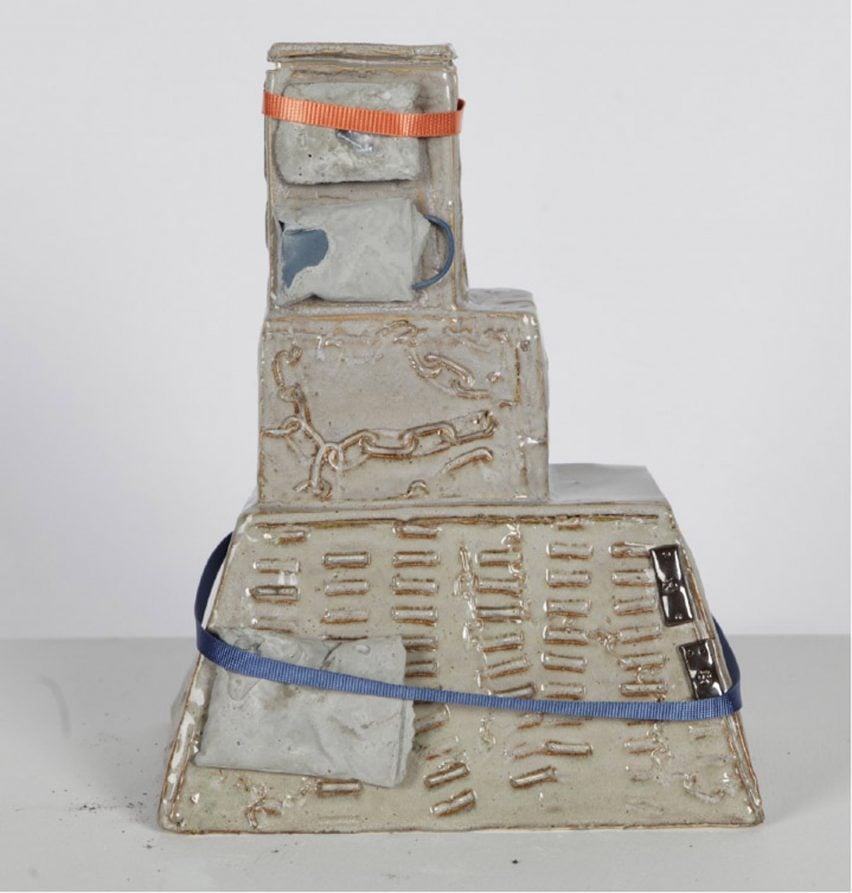
Concrete Need, Concrete Greed by Andrea Verdant
In October, Textile Design student Andrea Verdant’s collection Concrete Need, Concrete Greed was featured on Dezeen School Shows.
The collection explores post-war social housing, specifically focusing on tower blocks and council estates in East London.
“The work aims to amplify the voices of underrepresented people, highlighting their vital role in society and drawing attention to their overlooked experiences,” Verdant said.
“Evidence of aggressive regeneration highlights the lack of upkeep in these spaces, capturing imagery of overlooked architectural features, hostile architecture and signs of deterioration as injustice has become further rooted into the UK housing system.”
Student: Andrea Verdant
School: Loughborough University
Course: BA (Hons) Textile Design
View the full school show ›
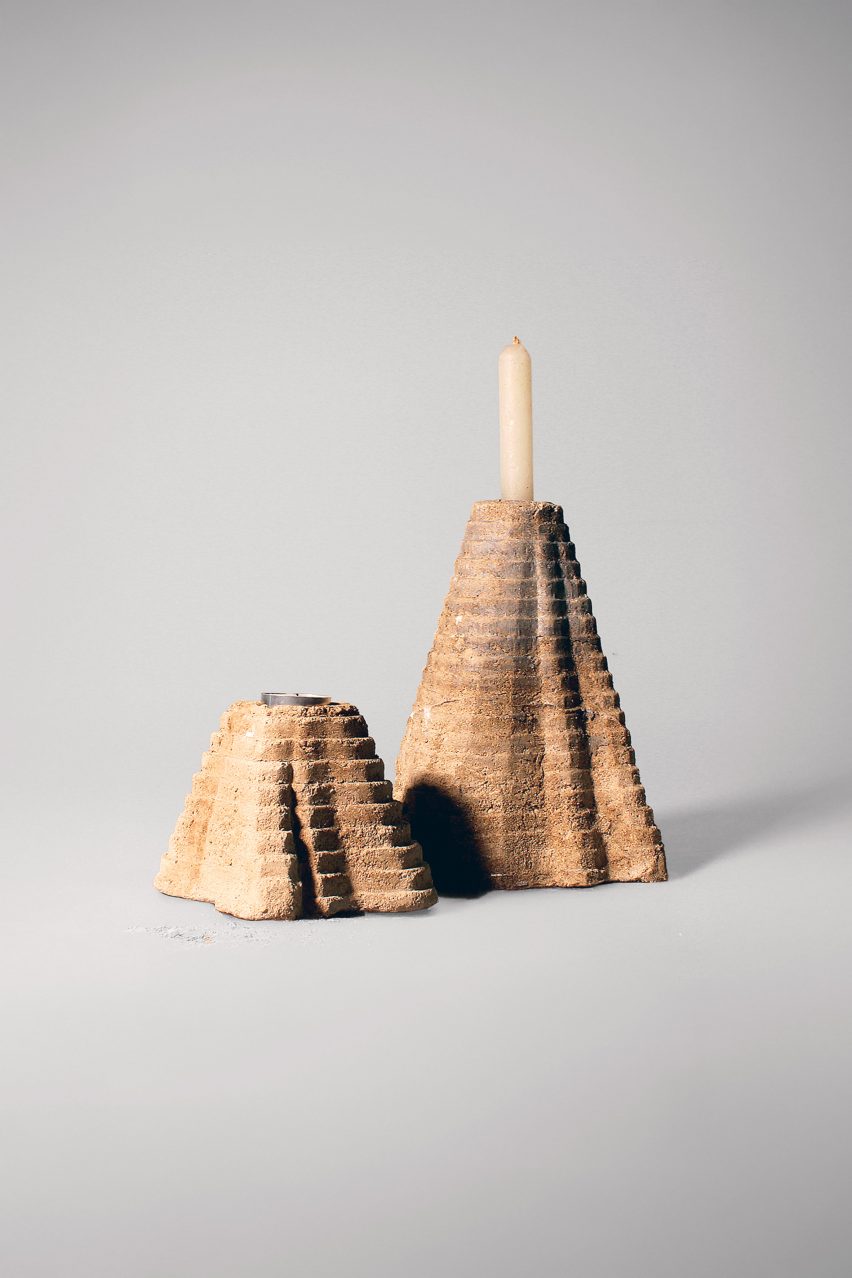
Pequeña Quebrada by Luis Fabricio Martínez Salinas
Featured in Instituto Tecnológico y de Estudios Superiores de Monterrey’s School Show in November, student Luis Fabricio Martínez Salinas produced Pequeña Quebrada, a candleholder which honours the people of Acapulco.
“This set of candle holders is made from a biomaterial of sand and starch, which gives a rough look that simulates the rock formations of the famous Quebrada site in Acapulco,” Salinas explained.
Student: Luis Fabricio Martínez Salinas
School: Instituto Tecnológico y de Estudios Superiores de Monterrey
Course: Inédito Universitario: Elemental y Cotidiano, 4th semester Campus Estado de México
View the full school show ›

Utopia by Melinda Doktor
In this December School Show, design student Melina Doktor’s project Utopia was featured, which focuses on utilising algae as a superfood via small-scale cultivation.
“The vision includes creating an algae biofarm designed for human-scale functionality, seamlessly integrating into both contemporary urban environments and speculative future scenarios,” said Doktor.
“Through research and design, processing methods are examined, compatible materials and the overall usability of algae for food purposes, showcasing its versatility through innovative recipes.”
Student: Melinda Doktor
School: Moholy-Nagy University of Art and Design Budapest (MOME)
Course: Designer-Maker MA
View the full school show ›
Partnership content
These projects are presented in school shows from institutions that partner with Dezeen. Find out more about Dezeen partnership content here.

